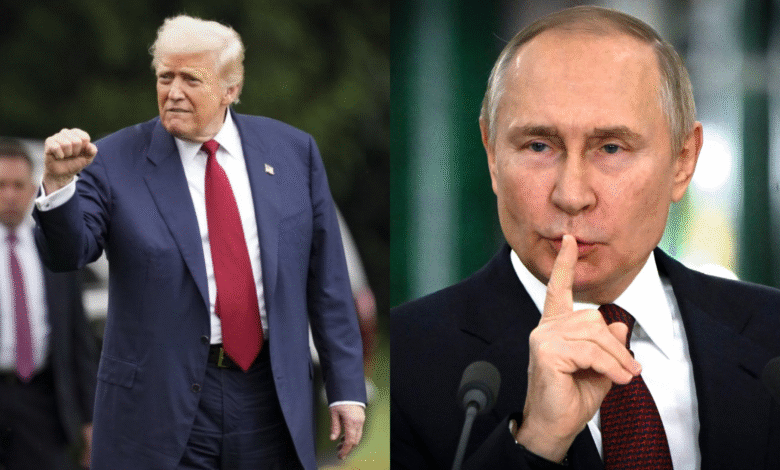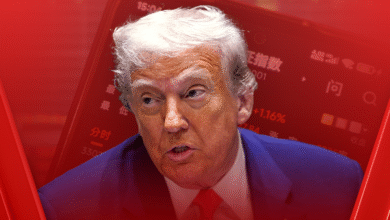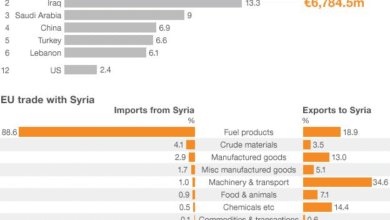Trump-Putin Talks: Economic Gains and Market Impacts

The upcoming Trump-Putin talks in Alaska have sparked a wave of interest and speculation, as the two leaders prepare to negotiate a potential end to the ongoing war in Ukraine. With the stakes as high as they are, this meeting is being viewed as a significant moment not only for US-Russia relations but also for the broader geopolitical landscape. Economists highlight that any agreements reached could be a boon for the Russian economy, which is currently struggling under the weight of international sanctions. Furthermore, financial markets are closely monitoring the outcomes, particularly defense stocks and other sectors that may fluctuate based on the talks’ progress. As the world awaits the results of this critical summit, the implications of these discussions are poised to reverberate far beyond Alaska.
As leaders from the United States and Russia prepare to engage in dialogue, the forthcoming negotiations between President Trump and President Putin have emerged as a pivotal event in recent international relations. These discussions, aimed at addressing the crisis stemming from the conflict in Ukraine, hold the potential to reshape not just bilateral dynamics but also the global financial landscape. Observers note that the Russian economy could stand to gain considerably if an agreement can be reached, leading to improvements in essential sectors such as financial markets and arms manufacturing. The implications of these talks extend to various stakeholders, from investors keeping a watchful eye on defense stocks to economies affected by the ongoing turmoil. In this context, the importance of these high-level talks cannot be overstated, as they may influence the future stability of the region and beyond.
The Significance of Trump-Putin Talks for the Russian Economy
The upcoming Trump-Putin talks in Alaska are being hailed as a significant event, particularly for the Russian economy, which has been struggling under the weight of sanctions and the effects of the ongoing Ukraine war. Analysts suggest that this meeting, the first time a U.S. president has hosted Putin on American soil since 2007, presents an exceptional opportunity for Russia to leverage its current battlefield successes. With the war having strained its economy, any potential easing of sanctions that may come from these talks could provide much-needed relief and revitalization for sectors that are currently stagnating.
Economists are particularly concerned with the demand for financial markets’ stability, as ongoing sanctions have led to a fiscal deficit in Russia alongside soaring inflation rates. The discussions between Trump and Putin offer a possible economic lifeline for the Kremlin, especially if they result in a ceasefire agreement and reduced sanctions. Industry experts are closely watching how the outcome of these talks could affect commodities, particularly oil and gas, which are central to Russia’s financial health. A positive agreement might also fortify investor confidence in the Russian economy, leading to increased foreign investment and economic recovery.
Implications for Ukraine War Negotiations
As the Trump-Putin talks approach, the situation in Ukraine remains critical. There are widespread concerns in Kyiv regarding the potential outcomes, particularly the implications for territorial integrity and sovereignty. Ukrainian officials, including President Zelenskyy, have expressed apprehension about being excluded from discussions that significantly impact their nation’s future, especially in light of recent Russian territorial gains. Such exclusions could lead to serious geopolitical repercussions, potentially destabilizing the region further and complicating Ukraine’s stance on peace negotiations.
Negotiating an end to the war in Ukraine involves various nuanced factors, including the need for a recognition of Ukraine’s territorial claims and sovereignty. European nations, aware of the potential for grave consequences, are urging for inclusion in dialogue and robust responses to Russian advances. The outcome of the Trump-Putin talks could thus either pave the way for a comprehensive peace agreement or exacerbate tensions further, with ramifications for US-Russia relations and the broader European security architecture.
The Rising Tension Between US-Russia Relations
The anticipated talks between Trump and Putin come at a crucial juncture for US-Russia relations, which have been characterized by tension and distrust in recent years. The discussions in Alaska provide a moment for reflection on the possibility of re-establishing a diplomatic dialogue that has been largely absent during times of heightened hostility. With both leaders presenting their positions on key issues, there lies the potential for either a thaw in relations or further escalation, heavily influenced by global public opinion and responses from key stakeholders.
Observers are keenly aware that the nature of the talks could set the tone for future interactions between the two nations. Meaningful progress in these discussions could lead to improved relations and enhanced collaboration on salient issues such as security, trade, and regional stability. However, failure to reach a consensus or the potential for punitive sanctions may deepen the divide, emphasizing the precarious nature of US-Russia diplomacy in the contemporary global landscape.
Impact on Global Financial Markets
The outcomes of the Trump-Putin talks are expected to reverberate through global financial markets, which have already shown signs of volatility in anticipation of the negotiations. Following the announcement of the meeting, stock markets in Europe and the U.S. reacted positively, showcasing a desire among investors for stability. The conversations about the cessation of hostilities in Ukraine and potential sanctions relief could elicit a surge in market confidence, particularly in sectors heavily influenced by geopolitical developments.
However, defense stocks are reacting differently, as traders speculate that peace talks may lead to a decrease in military spending by both Eastern and Western nations. This duality in market response highlights the inherent complexities of geopolitical negotiations, where advancements in diplomacy could shift investment patterns. Analysts urge investors to consider both the risks and opportunities, forecasting that regardless of outcomes, defense-related entities could stabilize demand through procurement enhancement in the longer term.
The Future of Defense Stocks Amid Diplomatic Talks
As the Trump-Putin talks unfold, defense stocks appear to be in a state of flux, caught between the hopes of a peaceful resolution and the realities of military preparedness. Some analysts remain optimistic, suggesting that regardless of the meeting’s outcome, defense stocks may see renewed demand if military inventories remain depleted. The ongoing conflict in Ukraine serves as a reminder of the persistent need for military readiness, positioning defense sector investments as potentially favorable.
Conversely, should peace be established, a shift in defense expenditure priorities may take hold, influencing how markets respond to these discussions. Investors are analyzing the potential for both decline and growth, with some viewing the weakened defense stocks as a buying opportunity amid speculative fears surrounding military spending. Ultimately, the trajectories of defense stocks pivot on the results of the Trump-Putin talks, emphasizing the interconnectedness of diplomacy, economics, and military readiness on a global scale.
Analyzing Sanctions Relief as a Negotiation Tool
Sanctions relief has emerged as a crucial negotiation tool in the context of the Trump-Putin talks, particularly as Russia pushes for economic advantages amid ongoing conflict. Since sanctions have severely impacted the Russian economy, discussions about lifting these restrictions could hold significant weight in negotiations. A favorable outcome for Russia might depend on the leaders’ abilities to come to common ground on measures that address both economic recovery for Russia and security concerns for Ukraine.
The effectiveness of sanctions as a diplomatic device hinges on their strategic application and the willingness of the U.S. to leverage them responsibly in future negotiations. Analysts caution that while there is potential for a beneficial agreement, the dynamics of sanction alleviation must consider international laws and ethical implications, as well as the long-standing implications for Ukraine’s territorial integrity. This balancing act will be pivotal in shaping the narrative surrounding the talks and their aftermath.
Geopolitical Ramifications of the Talks
The geopolitical landscape stands to undergo significant shifts following the Trump-Putin talks, setting new precedents for international relations depending on the outcomes achieved. Analysts worry about the broader implications of the meeting, particularly regarding how it might influence Russia’s strategies in the region, not just towards Ukraine, but also in relation to NATO and European security alliances. A perceived victory for Putin could embolden further aggressive behavior, reinforcing ongoing concerns about the stability of Eastern European nations.
Conversely, if substantial progress is made, the talks could herald a new era in US-Russia diplomacy, potentially redefining alliances and collaborative efforts on shared global challenges. The interconnectedness of these outcomes emphasizes the importance of diplomatic engagement in addressing multi-faceted geopolitical issues, where even minor agreements can have cascading effects for global governance, security policies, and economic alliances.
Investment Strategies Post-Trump-Putin Talks
In the wake of the Trump-Putin talks, investors are likely to recalibrate their strategies, assessing the nuances arising from any diplomatic shifts. With financial markets reacting instantaneously to news and sentiment around the talks, the investment landscape may see trends emerging based on anticipated economic developments. Investors should therefore remain vigilant and adaptable, monitoring how both sides communicate commitments to peace, sanctions, and economic cooperation.
Furthermore, identifying sectors that may directly benefit or suffer from the outcomes of the discussions will be critical in crafting a responsive investment plan. Whether it be through identifying undervalued defense stocks or emerging opportunities in the energy sector as sanctions adjustment occurs, astute investors may find themselves positioned favorably in the market landscape that follows this pivotal moment in US-Russia relations.
Conclusion: The Broader Impact of Trump-Putin Talks
As the Trump-Putin talks draw near, the ramifications of this meeting stretch beyond mere bilateral relations; they encompass a comprehensive reevaluation of global political, economic, and security dynamics. The intricate threads connecting military action, economic health, and international diplomacy underscore the importance of these negotiations in shaping future trajectories for both nations and their allies. The interplay between military advancements and diplomatic overtures will be closely watched, with potential consequences for market responses and geopolitical strategies.
Ultimately, the success or failure of the talks could reverberate through the world stage, inviting analysts, investors, and policymakers alike to reconsider the balance of power and influence in a rapidly changing global environment. It is in this context that the Trump-Putin talks find their relevance not just in terms of U.S.-Russia relations but also in framing the international response to conflicts that demand cooperative resolutions based on mutual interests.
Frequently Asked Questions
What are the implications of the Trump-Putin talks for US-Russia relations?
The Trump-Putin talks are pivotal in shaping US-Russia relations, as they mark a significant diplomatic engagement aimed at addressing key issues such as the Ukraine war negotiations. This meeting could potentially reset the trajectory of bilateral relations, especially if progress is made toward a ceasefire that satisfies both parties.
How could the Trump-Putin talks affect the Russian economy?
The Trump-Putin talks hold the potential to bolster the Russian economy, which has been struggling due to sanctions and the ongoing Ukraine conflict. A successful negotiation could lead to sanctions relief, which would help stabilize the economy and drive foreign investment back into Russia.
What role do defense stocks play in the context of the Trump-Putin talks?
Defense stocks are closely tied to the outcomes of the Trump-Putin talks. Positive developments in Ukraine war negotiations could lead to decreased military spending and lower demand for defense stocks. Conversely, if peace talks falter, there might be increased military budgets, creating opportunities for defense stock investments.
Are financial markets reacting positively to the news of the Trump-Putin talks?
Yes, global financial markets reacted positively to the announcement of the Trump-Putin talks, with stock markets rising as investors show optimism about the potential for a peaceful resolution to the Ukraine war. However, European defense stocks experienced some declines amid speculation about reduced military expenditure.
What are the expectations for Ukraine’s involvement in the Trump-Putin talks?
There is significant concern regarding Ukraine’s absence from the Trump-Putin talks, as Ukrainian officials, including President Zelenskyy, have not been invited. Many believe that any negotiations regarding Ukraine’s future must include Ukrainian representation to ensure their interests are considered.
What challenges does the Russian economy face leading up to the Trump-Putin talks?
Leading up to the Trump-Putin talks, the Russian economy faces significant challenges, including high inflation and a heavy fiscal deficit exacerbated by international sanctions. These economic pressures heighten the stakes for Putin’s negotiations and underline the importance of reaching a favorable outcome.
How might sanctions influence the outcomes of the Trump-Putin talks?
Sanctions play a crucial role in the Trump-Putin talks, as Russia is likely to seek immediate sanctions relief in return for concessions regarding the Ukraine conflict. The outcome of these negotiations will significantly hinge on how both leaders approach the issue of sanctions and economic recovery.
What potential strategies might Trump employ during the talks with Putin?
During the Trump-Putin talks, Trump might consider various strategies, including leveraging sanctions as a tool to pressure Putin into concessions. However, there is also speculation that Trump may prioritize achieving a diplomatic breakthrough for personal recognition, like a Nobel Prize, which could influence his approach.
What does the future hold for US-Russia relations after the Trump-Putin talks?
The future of US-Russia relations post Trump-Putin talks will largely depend on the outcomes of the negotiations. If they lead to a constructive dialogue and resolution of the Ukraine issue, it could signify a thaw in relations. Conversely, any failure to reach an agreement might lead to increased tensions and a continuation of the status quo.
Will Trump-Putin talks have an impact on global financial stability?
The Trump-Putin talks could significantly affect global financial stability. A resolution to the Ukraine war may boost markets and investor confidence, while ongoing conflict could exacerbate economic uncertainties, influencing financial markets, commodity prices, and investment strategies globally.
| Key Points |
|---|
| Talks between Trump and Putin in Alaska aim to negotiate an end to the Ukraine war. |
| The meeting is seen as a win for Putin, marking his first invitation to meet with a U.S. president on American soil since 2007. |
| Concerns exist over the potential ceding of Ukrainian territory to Russia, with Kyiv officials not invited to attend the talks. |
| Economists point out that while Russia is gaining on the battlefield, its economy struggles with high inflation and international sanctions. |
| Putin seeks sanctions relief and territorial concessions in exchange for a ceasefire deal. |
| Global financial markets reacted positively to the announcement of the talks, though defense stocks in Europe saw declines. |
| There’s potential for a ‘win-win’ scenario for European defense stocks, regardless of the talks’ outcomes. |
Summary
The Trump-Putin talks are significant not only for the dynamics surrounding the Ukraine conflict but also for their implications on global economic trends and defense markets. As the leaders of the United States and Russia meet to discuss a potential ceasefire, the immediate benefits appear to favor Moscow, highlighting the intricate interplay between geopolitical negotiations and economic conditions. With diverse opinions on the outcomes and their impact, the upcoming discussions are set to influence both regional stability and international financial markets.




